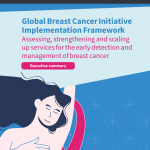Developed new document with roadmap to achieve goal of saving 2.5 million lives from breast cancer by 2040. In 95% of countries, breast cancer is still the first or second cause of female cancer death. THE DOCUMENT.
06 FEB –
The World Health Organization has released a new document with new guidance on how to boost the global breast cancer initiative with a roadmap to achieve the goal of saving 2.5 million lives from breast cancer by 2040.
The new document, launched on the occasion of the World Cancer Day campaign on February 4, recommends member countries to implement “the three pillars of health promotion”: early detection, timely diagnosis and comprehensive management of breast cancer.
WHO estimates that more than 2.3 million cases of breast cancer occur each year, making it the most common cancer among adults.
In 95% of countries, breast cancer is the first or second cause of female cancer death. However, breast cancer survival is vastly unequal between and within countries; almost 80% of breast and cervical cancer deaths occur in low- and middle-income countries.
“Countries with weaker health systems are less able to manage the growing burden of breast cancer,” she said Tedros Adhanom Ghebreyesus, WHO Director-General -. But we have the tools and know-how to prevent it and save lives. WHO is supporting more than 70 countries, especially low- and middle-income countries, to detect breast cancer earlier, diagnose it faster, treat it better and give all who have breast cancer hope for a future without it. cancer”.
Cancer in women, including breast cancer, leaves a devastating impact on the next generation. A 2020 study by the International Agency for Research on Cancer suggests that with an estimated 4.4 million women dying of cancer in 2020, nearly 1 million children were orphaned by cancer, 25% of them due to breast cancer.
Children who lose their mothers to cancer experience lifelong health and educational disadvantages, in many cases triggering chronic social and generational disruption, and in many cases financial damage.
The new document builds on proven strategies for designing country-specific and resource-appropriate health systems for the delivery of breast cancer care in low- and middle-income settings, detailing in particular three pillars of action with specific key indicators of performance:
- Recommend countries to focus on breast cancer early detection programs so that at least 60% of breast cancers are diagnosed and treated as early stage disease.
- Diagnosing breast cancer within 60 days of initial presentation can improve breast cancer outcomes. Treatment should begin within three months of the first presentation.
- Manage breast cancer so that at least 80% of patients complete the recommended treatment.
06 February 2023
© breaking latest news
More articles in Studies and Analysis






Online newspaper
of health information.
QS Editions srl
P.I. 12298601001
Registered office:
Via Giacomo Peroni, 400
00131 – Roma
Operational headquarters:
Via della Stelletta, 23
00186 – Roma
Luciano Fassari
Editorial director
Francesco Maria Avitto
President
Ernesto Rodriguez
- Joint Venture
- SICS srl
- Editions
Health Communication srl
Copyright 2013 © QS Edizioni srl. All rights reserved
– P.I. 12298601001
– registration in the ROC n. 23387
– registration with the Court of Rome n. 115/3013 of 05/22/2013
All rights reserved.
Policy privacy
